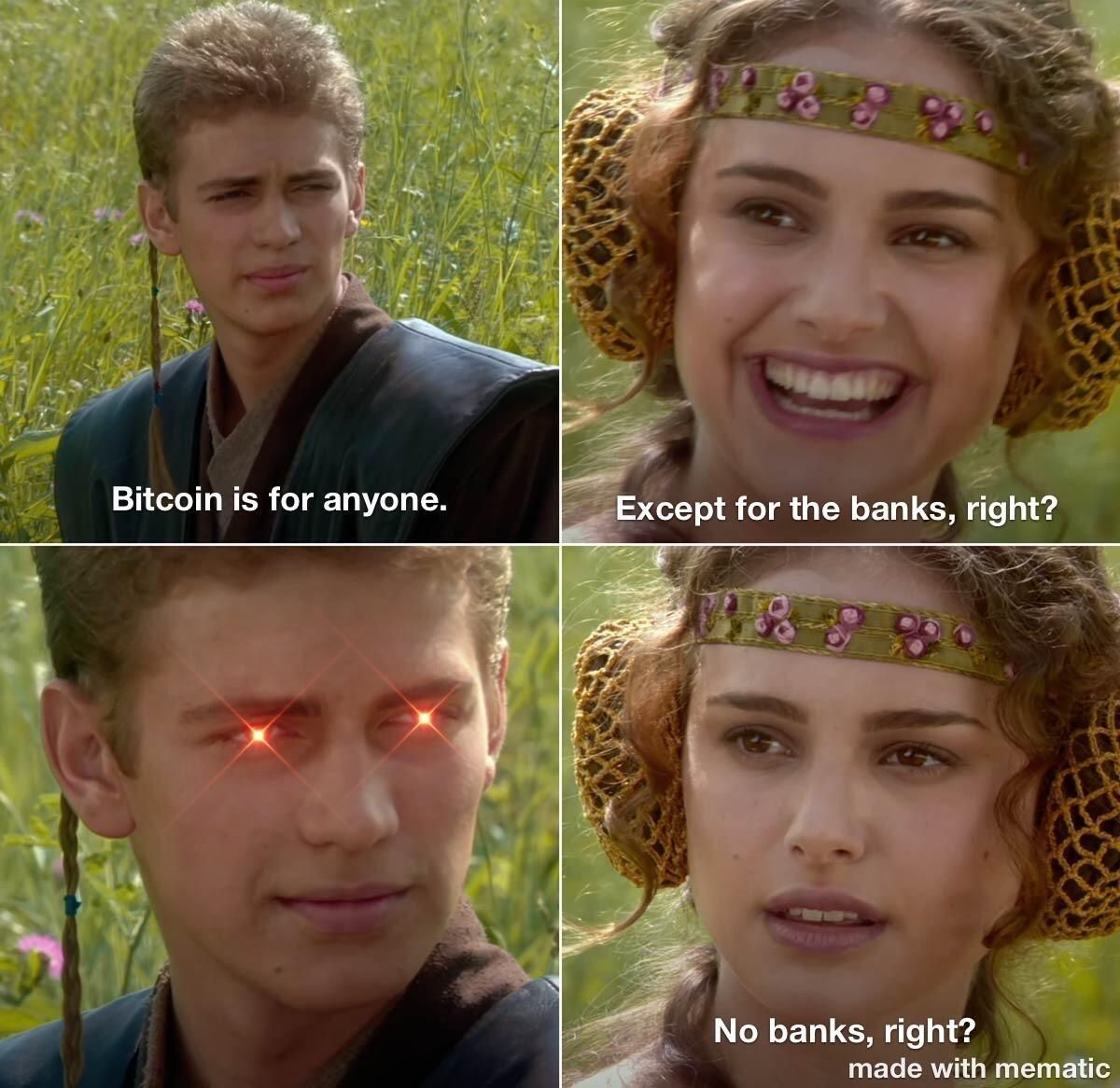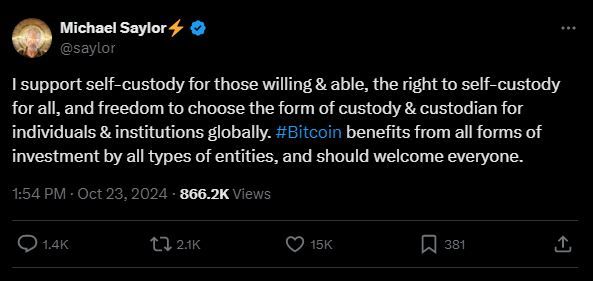and the distribution of digital products.
Michael Saylor: Is He Against Self-Custody And Bitcoin As A Medium of Exchange?
Is Michael Saylor entering his villain arch? Or will the MicroStrategy CEO retain his place as Bitcoin’s top spokesperson? He was the last cycle’s Bitcoin hero, but nowadays, his back is against the wall. All swords are pointed at Saylor because of his comments against Bitcoin self-custody. Why would that man say something so antithetical to Bitcoin’s values? We’ll get to that, but let’s get something straight first: \n
Michael Saylor doesn’t believe in Bitcoin as a Medium of Exchange. \n
And, considering that “A Peer-to-Peer Electronic Cash System” is in the whitepaper’s title, one could argue that his views aren’t aligned with the Bitcoin ethos.
\ As a successful businessman, it only makes sense that his take on Bitcoin comes from a status quo perspective… Or does it? We’re not privy to Saylor’s thoughts; he might just be saying what’s convenient at the moment. The old adage goes, “Watch what they do, not what they say,” and Michael Saylor did put MicroStrategy on the Bitcoin Standard. And doubled the bet every chance he got.
https://x.com/LyleHauser/status/1851077751207235839?embedable=true
\n The result of that series of bets: “In 44 months, our company went from a $600 million enterprise value to a $25 billion enterprise value,” he says in the video above. MicroStrategy uses Bitcoin as a Store Of Value, however. What are Michael Saylor’s views on Bitcoin as a Medium Of Exchange? The answer will not surprise anyone.
Michael Saylor: “It’s Not a Currency, It’s Property”According to traditional economic theory, the functions of money are Store Of Value, Medium Of Exchange, and Unit of Account. To be considered a full-fledged currency, Bitcoin should excel in all three. At the moment, the US Government considers Bitcoin as A.- a commodity and B.- property. Michael Saylor seems to believe this is the perfect state of affairs and bitcoiners shouldn’t rock the boat.
https://www.youtube.com/watch?v=x4-e5wq5AJ8&embedable=true
In December 2022 - an eternity in Bitcoin terms - the What Bitcoin Did podcast received Michael Saylor as a guest. “The IRS determined in 2014 that Bitcoin was property,” he said, and “when you transfer property, you owe a tax.” Saylor’s point was that no rational entity would pay for anything with property because it’s a taxable event. Plus, it’s illegal.
One Hundred Weak CurrenciesTo sell the Bitcoin-as-just-property idea, Saylor pits it against gold. Before doing so, he says, “I do think bitcoin is going to collapse currencies, but it won’t be the US dollar. It’s going to be the hundred weak currencies…” And then, in a telling moment, he takes it back and frames it differently.
\ "The US dollar is going to collapse all one hundred weak currencies if it gets on a crypto rail.” Bitcoin, on the other hand, “is going to collapse all the weak assets.” Examples of weak assets according to Michael Saylor: gold, Investment properties, natural gas rights, etc.
\ The MicroStrategy mastermind sort of predicts ETFs by asking, “Do I mind if JP Morgan starts custoding a billion dollars of Bitcoin?” Then, he explains how that scenario would play out. Bitcoin would go up and “demonetize a hundred trillion dollars of other assets.” Then, “the cost of food, housing, and clothing” would go down, society would “get more rational,” and “the effective ability to pay deficit with inflation” would deteriorate.
\ According to Michael Saylor, the “evolutionary approach” he describes is the path of least resistance.
Revolutionary Approach Vs. Evolutionary ApproachIn a nutshell, the Bitcoiner’s “revolutionary approach” hopes to build a new society using Bitcoin as the cornerstone. For that to happen, the old system has to collapse. The caveat is that the system is collapsing unprovoked, under its own weight. Fiat money’s natural boom and bust cycle is coming to an end. Bitcoin doesn’t cause the waves. Bitcoin is the lifeboat.
\ On the other hand, Michael Saylor seems to love the current system. Or, as he frames it, “I'm siding with the dollar over the peso and I’m siding with bitcoin over gold.” His strategy was always to acquire debt in a weaker currency at a low interest rate and buy BTC. However, that only works if the dollar exists. If Bitcoin becomes the currency and everybody uses it, the arbitrage disappears.
\

\ This is Michael Saylor’s advice for revolutionary approach proponents:
\
“If you’re really a bitcoin believer, the only thing you ought to be doing is buying as much bitcoin as possible. And you ought to find a bank that would loan you money against your bitcoin at the best most favorable terms, and your plan ought to be: I’m never going to pay a capital gains tax for the rest of my life. And, to the extent that I can construct an asset-rich portfolio of a lot of bitcoin, then I can just live off of borrowing the bitcoin and I never pay income tax the rest of my life.”
\ The MicroStrategy CEO said all of this in 2022. Has he remained consistent?
Michael Saylor’s Bitcoin BankMost of the previous ideas and advice are present in MicroStrategy’s latest plan to become a Bitcoin bank:
\
“The firm's strategy diverges from traditional banking models, as Saylor argues that investing in Bitcoin presents less counterparty risk compared to lending to individuals or corporations.
\ **He stated that MicroStrategy plans to continue borrowing from the fixed income market while investing in Bitcoin, aiming for an average annual return of 29%.”
\ The company currently owns 252,220 BTC, 1.2% of the total supply. When all is said and done, Michael Saylor aspires for MicroStrategy to be a “trillion dollar company.”
https://x.com/TomerStrolight/status/1852345000224305397?embedable=true
Analyzing the play, Bitcoin author Tomer Strolight only came up with this possible risky scenario:
\
“If debt markets dry up the whole thing starts to lose altitude and a strategic pivot will become necessary. But debt markets are absolutely colossal compared to MSTRs 3 year plan ($300 trillion according to MSTR's presentation) so we are probably not going to see the limit hit at a paltry $21 billion eased into over 3 years.”
\ His plan seems solid. However, is there a blind spot in the MicroStrategy CEO’s view of the situation?
Counterpoint: This is What Michael Saylor Doesn’t SeeIn an ideal future, who would have control over the money supply? The government or the people? It can’t be both. In Michael Saylor’s scenario, the power remains in the hands of the few. According to Jeff Booth, author of “The Price of Tomorrow,” the Bitcoin system “is incompatible with an inflationary monetary system meaning one of those systems must fail.”
\

\ \ If bitcoiners follow Michale Saylor’s plan, integrate BTC into the current financial system, and don’t use it as a Medium of Exchange, Booth thinks the result will be:
\
“A control system. An extractive rent seeking system that is NOT the free market (similar to the one we have had for 5000 years that resets every 100 or so years through war) continues to centralize by having you believe price of bitcoin is going up in fiat which makes the surveillance state stronger. This eventually centralizes Bitcoin - custodians, media, regulation (funded from the same manipulation of money) where it is attacked from layer 2. (Similar to gold).”
Counterpoint: The Current System Is Not FixableSharing a similar sentiment, In Bitcoin We Trust considers “Michael J. Saylor sees Bitcoin solely as a SoV that enables him to profit from the current system, which is flawed and not fixable.” The article considers financial institutions “are reclaiming their position as middlemen, which was denounced by Satoshi Nakamoto when he created Bitcoin.” They do this purposely because financial institutions “have clearly understood that Bitcoin was designed to make them obsolete.”
\ In Bitcoin We Trust’s predictions are similar to Jeff Booth’s:
\
“If you integrate Bitcoin within a flawed system, it won't be able to bring the benefits of its revolution to humanity. What's even more dramatic is that Michael J. Saylor continues to accumulate BTC with MicroStrategy without ever seeking to advance the Bitcoin revolution.” \ Now, Michael Saylor is in this to preserve MicroStrategy’s treasury’s purchase power. Is it his job to “advance the Bitcoin revolution”? Maybe it isn’t, but, why is this man so hell bent on contradicting Satoshi?
Satoshi Nakamoto On Trust In Central BanksIn this 2009 forum post titled “Bitcoin open source implementation of P2P currency,” Satoshi expressed his position on middlemen and trust:
\
“The root problem with conventional currency is all the trust that's required to make it work. The central bank must be trusted not to debase the currency, but the history of fiat currencies is full of breaches of that trust. Banks must be trusted to hold our money and transfer it electronically, but they lend it out in waves of credit bubbles with barely a fraction in reserve. We have to trust them with our privacy, trust them not to let identity thieves drain our accounts.” \ Keep that idea in mind as we return to the present.
Michael Saylor Vs. Paranoid Crypto Anarchistshttps://youtu.be/DevkAbG1mGc?embedable=true
In the Markets with Madison episode titled “The Bitcoin revolution & risks with Michael Saylor,” the MicroStrategy CEO dropped bombs. He claimed that Americans voluntarily turned in their gold in 1933, called believers in Bitcoin self-custody “paranoid crypto-anarchists,” and doubled down on that sentiment by going full statist:
\
“I think that when the bitcoin is held by a bunch of crypto-anarchists who aren’t regulated entities, who don’t acknowledge government or don’t acknowledge taxes, or don’t acknowledge reporting requirements, that increases the risk of seizure.”
\ In a recent CNBC interview he took his extreme views even further by saying, “For the [Bitcoin] industry to move to the next level, we need to migrate to 'adult supervision.' We're gonna need big banks to become the crypto custodians.” Now, do you think Michael Saylor is talking about letting a bank custody MicroStategy’s BTC or is he announcing his company’s new banking services?
Bitcoin-Backed Banks Vs. Self-CustodyMichael Saylor’s views align relatively well with pioneer Hal Finney’s ideas about Bitcoin and scaling:
\
“Actually there is a very good reason for Bitcoin-backed banks to exist, issuing their own digital cash currency, redeemable for bitcoins. Bitcoin itself cannot scale to have every single financial transaction in the world be broadcast to everyone and included in the block chain. There needs to be a secondary level of payment systems which is lighter weight and more efficient. Likewise, the time needed for Bitcoin transactions to finalize will be impractical for medium to large value purchases.”
\ Hal couldn’t predict that the Lightning Network would resolve all those issues without bank intervention. Or that Wall Street would use derivatives and presumably paper Bitcoin to try to manipulate their way in. Or that a person with full conviction like Michael Saylor would come into the scene and try to materialize his vision for Bitcoin.
\

After the backlash, the MicroStrategy CEO tried to appease the Bitcoin community by tweeting:
\
“I support self-custody for those willing & able, the right to self-custody for all, and freedom to choose the form of custody & custodian for individuals & institutions globally. Bitcoin benefits from all forms of investment by all types of entities, and should welcome everyone.” \ Nothing Michael Saylor wrote is objectionable. One of the community’s slogans is “Bitcoin is money for enemies,” even the worst people imaginable should have access to a permissionless currency. And, even though everybody should self-custody their Bitcoin, many people and institutions will not be able to do it.
\ That doesn’t change the facts, the MicroStrategy CEO seems to be looking after the interests of the middlemen or trying to become one himself.
Counterpoint: Jack Mallers On Self-SovereigntyIn 1933, people voluntarily surrendered their gold in the same way people pay taxes. A subtle threat of violence propelled them to comply. Back then, rebels who wanted to keep their gold faced huge fines, jail time, and seizure of their assets. Could this happen again? Could the government make MicroStrategy’s custodians produce the company’s private key and pay pennies on the dollar for their BTC?
https://www.youtube.com/watch?v=zOGUqBqWlYQ&embedable=true
As for self-custody and self-sovereignty, Strike’s Jack Mallers fired back at Michael Saylor and explained why we need both on his Money Matters podcast:
\
“Calling self-custody crypto anarchism oversimplifies Bitcoins innovation to empower the individual. Bitcoin's not about rejecting the government from the highest form possible, Bitcoin is information, Bitcoin is text. Bitcoin is about free speech. Bitcoin is about property rights. Bitcoin is about the freedom to manage your own money, your own property, your own time, your own energy, your own labor, your own future.”
\ In other words, self-custody is paramount and bitcoiners don’t want or need “adult supervision.” One of Bitcoin’s main innovations is the ability to avoid paternalism by putting the tools in everyone’s hands.
Could Michael Saylor Be Playing Dumb?In January 2024, Michael Saylor and MicroStrategy settled a tax fraud lawsuit for $40 million. In a statement, Attorney General Brian Schwalb wrote, “Saylor openly bragged about his tax-evasion scheme, encouraging his friends to follow his example, and contending that anyone who paid taxes to the District was stupid.” After a blow like that, anyone would’ve become a statist in front of the camera.
https://x.com/WayneVaughan/status/1851382785740517387?embedable=true
Also, consider what fellow billionaire Howard Lutnick told Anthony Pompliano:
\
“The whole Bitcoin Nation should just call it a commodity, never a currency. Just call it a commodity because if it's a currency you're attacking the politicians of the country right you're you're trying to replace my currency with yours but if you say: hey hey hey I'm just oil, I'm just gold, I'm just a commodity, leave me be. Right? Then, they'll leave you be.”
\ Is Michael Saylor just playing his part and helping Bitcoin fly under the radar? In 1984, Austrian economist F.A. Hayek said, "I don't believe we shall ever have good money again before we take the thing out of the hands of government. That is, we can't take it violently out of the hands of government, all we can do is by some sly roundabout way introduce something that they can't stop." Is that the game Michael Saylor is playing? Or are we giving him too much credit?
Conclusion: Two Possible ScenariosIf Michael Saylor is playing dumb, then it’s as Giacomo Zucco tweeted.“If Saylor's role is to pretend to be a statist boomer to "protect Bitcoin", then *our* role is to pretend to call him out as a statist boomer. We are protecting Michael.”
https://x.com/giacomozucco/status/1848593809157861812?embedable=true
However, on the other hand, the MicroStrategy CEO might just be loyal to his class and protect other billionaires’ interests. After all, he’s a successful businessman looking to preserve his company’s fiat gains.
\ Or is he?
\ This was a dispatch by Eduardo Prospero, Bitcoin’s ambassador to HackerNoon.
\ In case you missed them, these are the previous dispatches →
\ 1 - “Why BITCOIN ONLY? - Bitcoin is NOT “Crypto”
2 - “Bitcoin Is The ONLY Digital Scarcity That Matters — Here's Why”
3.- “Bitcoin’s Weak Spot: Mining Centralization and How We're Working on It”
4.- “Bringing Energy To Those Who Need It: Five Mind-Blowing Bitcoin Mining Stories”
5.- “In 2013, A Time Traveler Warned Us About Our Bitcoin Future. How Right Was He?”
6.- “The Hidden Hand: Is Paper Bitcoin Suppressing BTC Prices?”
7.- “Daniel Jeffries Tried To Predict Bitcoin’s Future in 2017: How We Can Learn From It“
\n
- Home
- About Us
- Write For Us / Submit Content
- Advertising And Affiliates
- Feeds And Syndication
- Contact Us
- Login
- Privacy
All Rights Reserved. Copyright , Central Coast Communications, Inc.